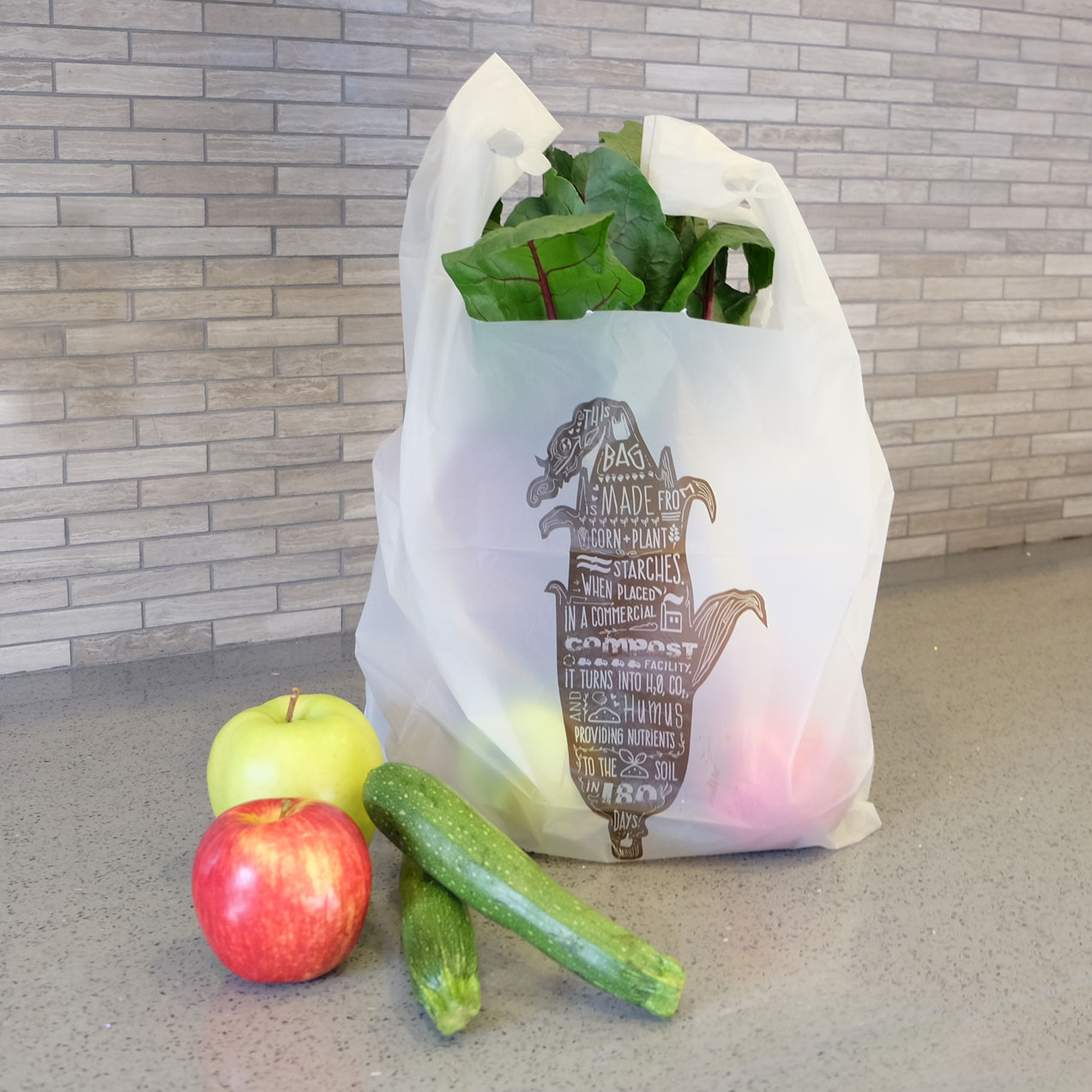A woman carries a plastic bag at a market in Montreal on June 13, 2019. Paul Chiasson/The Canadian Press
If Ottawa can’t get the small stuff right, why should Canadians trust the federal government with the big things? This is what comes to mind as Ottawa’s ban on single-use plastic checkout bags settles in on Calgary. Biodegradable Takeway Bags

In December, plastic checkout bags – along with plastic cutlery, foodservice ware, stir sticks and (most) straws – will be banned for sale. Caught up in the impending prohibition are Calgary Co-op stores, a grocery chain focused on local and western Canadian products that sells compostable bags at the till for 15 cents each.
The bags will be included in the ban. The federal government says in essence they’re the same as conventional plastics because they need special municipal facilities to be broken down and won’t rot away on a forest floor.
This debate is not as weighty as one regarding Canada’s climate policy or an energy transition. But it’s frustrating enough to warrant being an agenda item from Alberta Environment Minister Rebecca Schulz when she met with federal Environment Minister Steven Guilbeault earlier this month. Calgary Mayor Jyoti Gondek has also written Mr. Guilbeault on the matter, saying the compostable bags “could serve as a transitional strategy and support Calgarians as they move fully toward reusable bags over time.”
From the point of view of the retailer, the issue is ridiculously clear-cut. Calgary Co-op’s checkout bags, sold at a rate of 33 million annually, allowed the retailer to dispense completely with plastic bags four years ago. Their compostable bags – made of a biodegradable polymer and polylactic acid created from fermented corn starch – were developed by Calgary-based LEAF Environmental Products Inc. They contain no plastic or microplastic materials and have Biodegradable Products Institute certification, the U.S. gold standard.
Certainly, not all compostable bags are created equal. These particular ones won’t break down in nature; a high-temperature, high-moisture municipal composting system is needed. But Calgary has such a system.
And even as single-bag sales are banned at the till, the federal government will still allow the bulk sale of both plastic and compostable bags. Calgary Co-op’s argument is that allowing retailers to sell compostable bags in boxes on store shelves but not at checkouts just a few feet away is nonsensical. Paper bags, they add, are resource-heavy to produce and awkward for customers to carry.
Restaurants debut new takeout ware amid phase-in of single-use plastics ban
Calgary Co-op chief executive Ken Keelor is still hopeful his stores will be granted an exception “ideally before it kicks in on December the 20th, the busiest week in retail of the whole year.” He acknowledges there’s a possibility an exemption won’t be made, “which I think would be very goofy.”
But the federal government seems immovable on this front, with a rigidity on this rule that can be viewed as admirable or foolhardy.
“The Government of Canada is taking a precautionary approach to dealing with problematic single-use plastics,” Kaitlin Power, a spokesperson for Mr. Guilbeault, said in an e-mail. “Exemptions are not being considered at this time.”
Environment and Climate Change Canada, she said, is worried about the difficultly of distinguishing between compostable and non-compostable bags, leading to contamination problems for recycling and organics processors (obviously this is still a problem for compostable bags bought in bulk). Their science assessment also “found a lack of significant evidence that compostable plastics will fully degrade in natural environments” – which Calgary Co-op discloses.
Every retailer is taking a different approach to phasing out plastics; most are not pursuing compostable bags in this fashion. Mr. Guilbeault’s office didn’t say this, but perhaps the department is worried less about contradictions in its ban than setting a precedent for allowing these bags to be sold at the till when composting facilities across the country vary widely by municipality. Obviously, reusable shopping bags and bins are a huge part of the equation. But it’s a far from clear-cut process either: Walmarts in Canada have recently run into trouble in this regard, giving out so many reusable bags to customers who order groceries that they’re creating whole new piles of waste.
I’m not against smart legislation on plastics. The scale of global plastic use, and our collective reliance on it these past few decades, is overwhelming. Plastic waste is even scarier, whether you’re talking about the floating plastic islands of the Pacific Ocean or the microplastics in our bloodstreams. Cutting back is a first step.
In our household, we want to avoid buying boxes of plastic bags to line our garbage cans (once the job of reused grocery store bags). We’ve become adept at using old bread and potato chip bags as garbage bags.
But, full disclosure, the Calgary Co-op bags – bought when I forget reusable bags – sometimes line our kitchen compost pail. As we move to reduce plastic use, the further evolution of plant-based compostable products as a replacement for some items will be unavoidable.
Mr. Guilbeault’s office said further studies on these kind of products are needed. But by the end of this year, it plans to cut off the product innovation, happening in Calgary.
If the federal government can’t develop some kind of nuance here, how can they handle the big questions around building out electricity grids or competing with the United States on the Inflation Reduction Act’s plan for energy projects? An immovable position on the compostable bags sold by a small grocery chain in Calgary is not confidence inspiring.
Follow Kelly Cryderman on Twitter: @KellyCrydermanOpens in a new window
Build your personal news feed
Build your personal news feed
© Copyright 2023 The Globe and Mail Inc. All rights reserved.

Plastic Garbage Bags Andrew Saunders, President and CEO